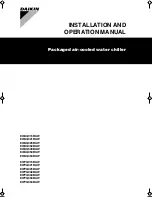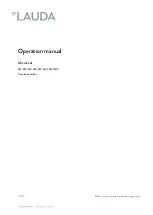
RT 75
36
22.
Install the tine shaft. It will pass through the bearing
bore, through the tine shaft worm gear and out the
other side of the transmission.
23.
Slide the Hi-Pro key into the tine shaft worm gear.
24.
On each side, slide the washer over the tine shaft.
25.
Insert the tine shaft bearings over the tine shaft until
they pass the snap ring grooves in the transmission
housing.
NOTE:
A bearing installation tool can be made
using a 1” I.D. PVC pipe by 7” long.
26.
Install both of the snap rings that retain the tine
shaft bearing in the transmission housing using a
pair of snap ring pliers. See Figure 6.25.
27.
Slide the drive shaft assembly into the front tapered
roller bearing race.
28.
Position the rear bearing race over the rear tapered
roller bearing. See Figure 6.26.
29.
Set the rear bearing cap in position.
NOTE:
Do not put sealant on the bearing cap.
30.
Fasten the rear bearing cap to the transmission
housing with the hex flange screws, using a 1/2”
wrench.
NOTE:
The washers from step five go on the top
two screws.
31.
Tighten the hex screws to a torque of 100 in lbs. (11
Nm).
NOTE:
The drive shaft rides in a pair of tapered roller bearings. Tapered roller bearings have low friction, a lot
of surface area and they bear thrust loads very well. The worm drive system used in this tiller is very
sturdy, but it generates high thrust loads on the drive shaft. If the end-play is too tight, the bearings will
overheat as they are jammed into their races. When the end play is too loose, the bearings will move
around in their races. This will cause damage to the rollers, the cages, and will put dimples in the
races.
Figure 6.25
Snap ring
Figure 6.26
bearing race
Summary of Contents for RT-75
Page 2: ......
Page 4: ...II ...
Page 10: ...RT 75 6 ...
Page 14: ...RT 75 10 Belt Routing Forward drive belt Reverse drive belt Transmission pulley Engine Pulley ...
Page 20: ...RT 75 16 ...
Page 24: ...RT 75 20 ...
Page 30: ...RT 75 26 ...
Page 53: ......
Page 54: ...MTD Products Inc Product Training and Education Department FORM NUMBER 769 09590 00 12 2013 ...















































